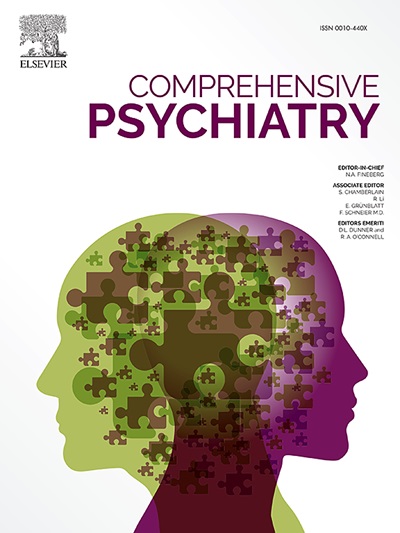边缘型人格障碍严重程度指数-5的4周版本的心理测量特性
IF 4.2
2区 医学
Q1 PSYCHIATRY
引用次数: 0
摘要
本研究评估了新版边缘型人格障碍严重程度指数-5的心理测量特性,该指数在4周内评估BPD症状的严重程度,而不是标准的3个月:bpdsi -5-4周。在BPD患者(n = 92)、逃避型人格障碍(APD)患者作为临床对照组(n = 16)和非患者对照组(n = 20)的混合样本中进行信度和效度评估。研究表明,BPDSI-5-4wk具有非常高的判读一致性和重测信度,并且具有良好的内部一致性。验证性因子分析支持其假设的九因子结构。当BPDSI-5-4wk与BPDSI-5(3个月版)、DSM人格障碍结构化临床访谈(SCID-5-P)以及其他一些BPD和其他心理健康相关自我报告问卷相关联时,BPDSI-5-4wk也显示出非常好的构念效度(即已知组),以及标准相关效度(即并发效度)。此外,我们还获得了区分BPD与临床对照组(21.02,85%敏感性,94%特异性)、非患者对照组(10.50,98%敏感性,100%特异性)以及两个对照组联合(17.26,93%敏感性,92%特异性)的高灵敏度和特异性的截止评分。建立了5.88的可靠变化判据。初步试验数据还显示了BPDSI-5-4wk对变化的敏感性。BPDSI-5-4wk的高可靠性和有效性支持其在较短时间内对BPD症状严重程度进行详细、维度评估的价值。这将促进频繁的治疗反应评估,快速指示后续治疗,并与临床试验中较短的干预和随访期更好地结合。本文章由计算机程序翻译,如有差异,请以英文原文为准。
Psychometric properties of the 4-week version of the Borderline Personality Disorder Severity Index-5
This study evaluated the psychometric properties of a new version of the Borderline Personality Disorder Severity Index-5 that assesses BPD symptom severity over the course of 4 weeks instead of the standard 3 months: the BPDSI-5-4wk. Reliability and validity were evaluated in a mixed sample of patients with BPD (n = 92), patients with avoidant personality disorder (APD) as clinical control group (n = 16), and a non-patient control group (n = 20). The study demonstrated very high interrater agreement and test-retest reliability and acceptable to excellent internal consistencies of the BPDSI-5-4wk. Confirmatory factor analysis supported its assumed nine-factor structure. The BPDSI-5-4wk also showed very good construct (i.e. known-group) validity, as well as criterion-related (i.e. concurrent) validity when correlating the BPDSI-5-4wk with the BPDSI-5 (3-month version), the structured clinical interview for DSM personality disorders (SCID-5-P), and several other BPD- and other mental health-related self-report questionnaires. We additionally derived cut-off scores with high sensitivity and specificity for distinguishing BPD from clinical controls (21.02, 85 % sensitivity, 94 % specificity), from non-patient controls (10.50, 98 % sensitivity, 100 % specificity), and from both control groups combined (17.26, 93 % sensitivity, 92 % specificity). A reliable change criterion of 5.88 was established. Preliminary trial data additionally showed the BPDSI-5-4wk's sensitivity to change. The strong reliability and validity of the BPDSI-5-4wk support its value for detailed, dimensional assessment of BPD symptom severity over shorter time frames. This will facilitate frequent treatment response evaluations, rapid indication of follow-up treatment, and better alignment with shorter intervention and follow-up periods in clinical trials.
求助全文
通过发布文献求助,成功后即可免费获取论文全文。
去求助
来源期刊

Comprehensive psychiatry
医学-精神病学
CiteScore
12.50
自引率
1.40%
发文量
64
审稿时长
29 days
期刊介绍:
"Comprehensive Psychiatry" is an open access, peer-reviewed journal dedicated to the field of psychiatry and mental health. Its primary mission is to share the latest advancements in knowledge to enhance patient care and deepen the understanding of mental illnesses. The journal is supported by a diverse team of international editors and peer reviewers, ensuring the publication of high-quality research with a strong focus on clinical relevance and the implications for psychopathology.
"Comprehensive Psychiatry" encourages authors to present their research in an accessible manner, facilitating engagement with clinicians, policymakers, and the broader public. By embracing an open access policy, the journal aims to maximize the global impact of its content, making it readily available to a wide audience and fostering scientific collaboration and public awareness beyond the traditional academic community. This approach is designed to promote a more inclusive and informed dialogue on mental health, contributing to the overall progress in the field.
 求助内容:
求助内容: 应助结果提醒方式:
应助结果提醒方式:


